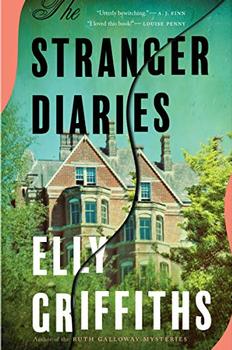Summary | Excerpt | Reviews | Beyond the Book | Readalikes | Genres & Themes | Author Bio

'His servant.'
'His son. Has to be restrained because he's a dangerous lunatic.' 'His dog.'
Laughter.
'Actually,' I say, 'Ted is right, Herbert is a dog. The companion animal is an important trope in the ghost story genre because an animal can sense things that are beyond human comprehension. What can be scarier than a dog staring at something that isn't there? Cats are famously spooky, of course. Think of Edgar Allan Poe. And animals were often thought to be witches' familiars, helping them perform black magic. But Animal characters can be useful for another reason. Can anyone guess what it is?'
No one can. It's mid-afternoon, nearly break time, and they are thinking of coffee and biscuits rather than fictional archetypes. I look out of the window. The trees by the graveyard are dark even though it's only four o'clock. I should have saved the short story for the twilight session really, but it's so difficult to cover everything on a short course. Time to wrap things up.
'Animals are expendable,' I say. 'Authors often kill them to create tension. It's not as significant as killing a human but it can be surprisingly upsetting.'
The members of the creative writing group go clattering down the stairs in search of caffeine but I stay in the classroom for a bit. It's very strange being in this part of the school. Only adult education classes get taught here; the rooms are too small and too odd for lessons. This one has a fireplace and a rather disturbing oil painting of a child holding what looks like a dead ferret. I can just imagine the Year 7s trying to disappear up the fireplace like twentyfirst-century chimney sweeps. Most school life at Talgarth High happens in the New Building, a 1970s monstrosity of plate glass and coloured bricks. This building, the Old Building, which was once called Holland House, is really just an annex. It has the dining hall, the kitchens and the chapel, as well as the head teacher's office. The first floor has rooms which are sometimes used for music practice or drama. The old library is there too, now only frequented by teachers because the students have a modern version in the New Building, with computers and armchairs and paperbacks in carousels. The top floor, which is out-of-bounds to students, is where R.M. Holland's study
is, preserved just as he left it. The creative writing students are always excited to learn that the author of The Stranger actually lived in this house. In fact, he hardly ever left it. He was a recluse, the old-fashioned sort with a housekeeper and a full staff. I'm not sure I would leave the house myself if I had someone to cook and clean for me, to iron the Times and place it on a tray with my morning infusion. But I have a daughter, so I would have to rouse myself eventually. Georgie would probably never get out of bed without me to shout the time up the stairs, a problem R.M. Holland certainly never had, although he may, in fact, have had a daughter. Opinion is divided on this point.
It's October half-term and, with no pupils around, and spending all my time in the Old Building, it's easy to imagine that I'm teaching at a university, somewhere ancient and hallowed. There are parts of Holland House that look almost like an Oxford college, if you ignore the New Building and the smell of the gymnasium. I like having this time to myself. Georgie is with Simon and Herbert is in kennels. There's nothing for me to worry about and, when I get home, there's nothing to stop me writing all night. I'm working on a biography of R.M. Holland. He's always interested me, ever since I read The Stranger in a ghost story anthology as a teenager. I didn't know about his connection to the school when I first applied here. It wasn't mentioned in the advertisement and the interview was in the New Building. When I found out, it seemed like a sign. I would teach English by day and, in the evenings, inspired by my surroundings, I would write about Holland; about his strange, reclusive life, the mysterious death of his wife, his missing daughter. I made a good start; I was even interviewed for a news item on local TV, walking awkwardly through the Old Building and talking about its previous occupant. But, recently — I don't know why — the words have dried up. Write every day, that's what I tell my students. Don't wait for inspiration, that might not come until the end. The muse always finds you working. Look into your heart and write. But, like most teachers, I'm not brilliant at taking my own advice. I write in my diary every day, but that doesn't count because no one else is ever going to read it.
Excerpted from The Stranger Diaries by Elly Griffiths. Copyright © 2019 by Elly Griffiths. Excerpted by permission of Houghton Mifflin Harcourt. All rights reserved. No part of this excerpt may be reproduced or reprinted without permission in writing from the publisher.




Men are more moral than they think...
Click Here to find out who said this, as well as discovering other famous literary quotes!
Your guide toexceptional books
BookBrowse seeks out and recommends the best in contemporary fiction and nonfiction—books that not only engage and entertain but also deepen our understanding of ourselves and the world around us.